"Crossroads of Peace" is a reflection of Armenia's commitment to achieving peace in the region - Canadian Ambassador's interview to ARMENPRESS
19 minute read

YEREVAN, JUNE 27, ARMENPRESS. Canada views the "Crossroads of Peace" project, initiated by the Government of the Republic of Armenia, as an optimal solution for unblocking regional communications. The project underscores Armenia's constructive commitment to the peace process and its forward-looking approach.
The Ambassador of Canada, Andrew Turner expressed this opinion in an interview with Armenpress, discussing prospects for Armenian-Canadian relations, regional developments, the activities of the newly opened Canadian embassy in Armenia, and other related topics.
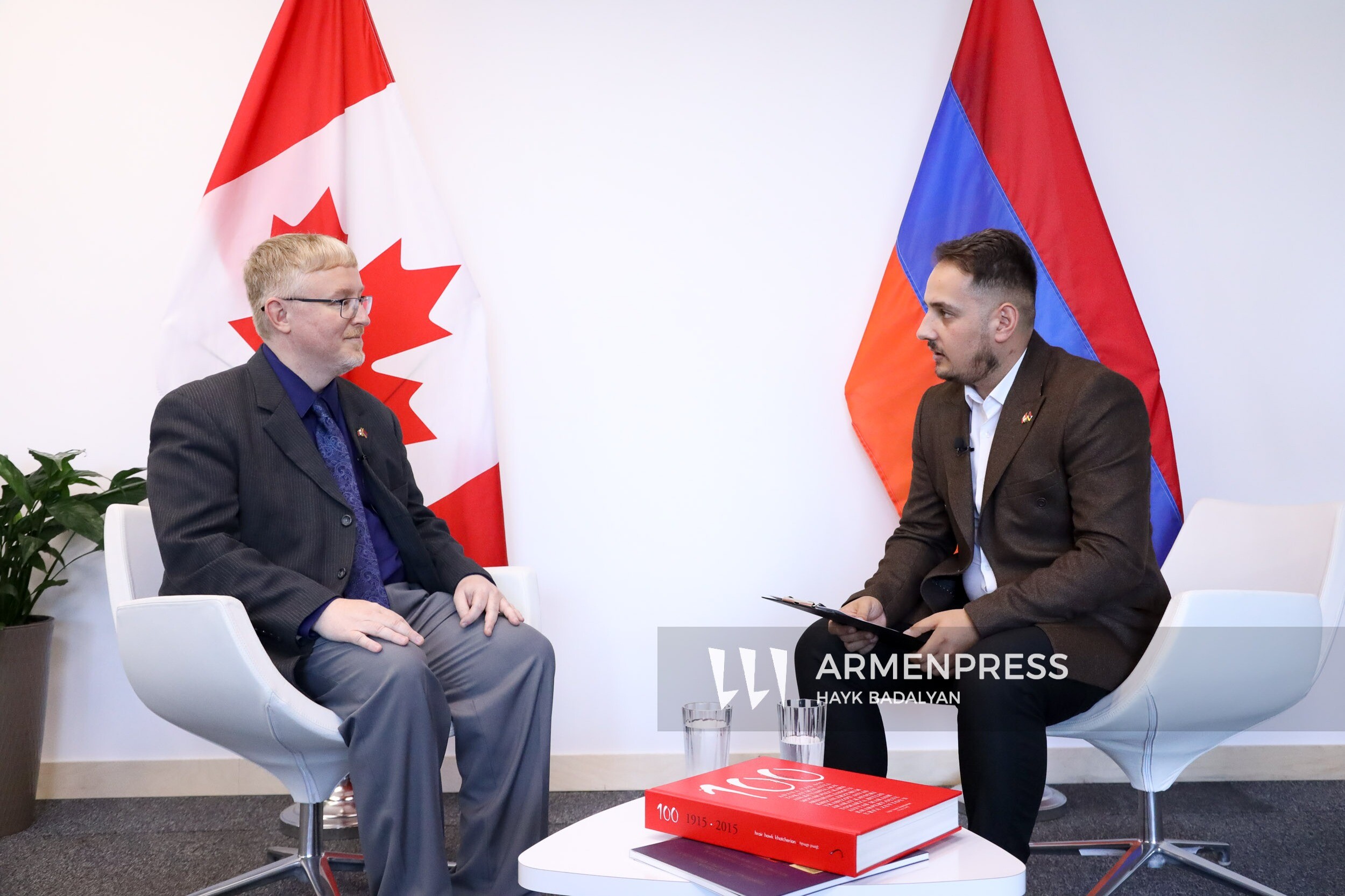
- Mr. Ambassador, in October 2023, Canada officially opened its embassy in Armenia, with the ceremony attended by Foreign Affairs Minister Mélanie Joly. During a joint press conference with her Armenian counterpart, Ararat Mirzoyan, she stated that the embassy's opening aims to deepen and strengthen ties between Armenia and Canada. How would you assess the current level of political dialogue between the two countries, and what key points would you highlight in this regard?
- I think it is excellent. And the only challenge is listing everything that we have been able to do in such a short amount of time. But since the Embassy opened, we have had many more visits, including more parliamentarians. We have had our first business delegation. We have had senior government officials from our police, from military. We had our Ambassador for Women, Peace and Security. So we have had lots and lots of opportunity to exchange. And perhaps even more importantly, just because I and my colleagues are here at the Embassy, we have had the chance to engage with Armenians around the country on the ground. And it's absolutely wonderful to see how welcome Canada is and how much desire there is to strengthen the partnership between our two countries.
- Mr. Turner, almost a year has passed since the opening of the Canadian Embassy in Armenia. How would you evaluate the work done during this period, and what impact has it had on Armenian-Canadian relations?
- I think the work has gone very well. We are still obviously doing a lot of work physically getting the Embassy set up, as you can see. All of those logistical tasks of staffing and construction and getting official vehicles registered. But all of this is laying a foundation that will ensure that the Embassy is able to strengthen ties with Armenia for decades to come. And simply by being here, and even in the transitional phase as we get set up, we are able to facilitate all of these visits and exchanges and opportunities for partnership, several of which I had mentioned. And there are many others, our role in the Eueopean Union Observer Mission. And all of this is coming, I think, because the Embassy is here and functioning. And it's only going to become even stronger as we get full capacity.
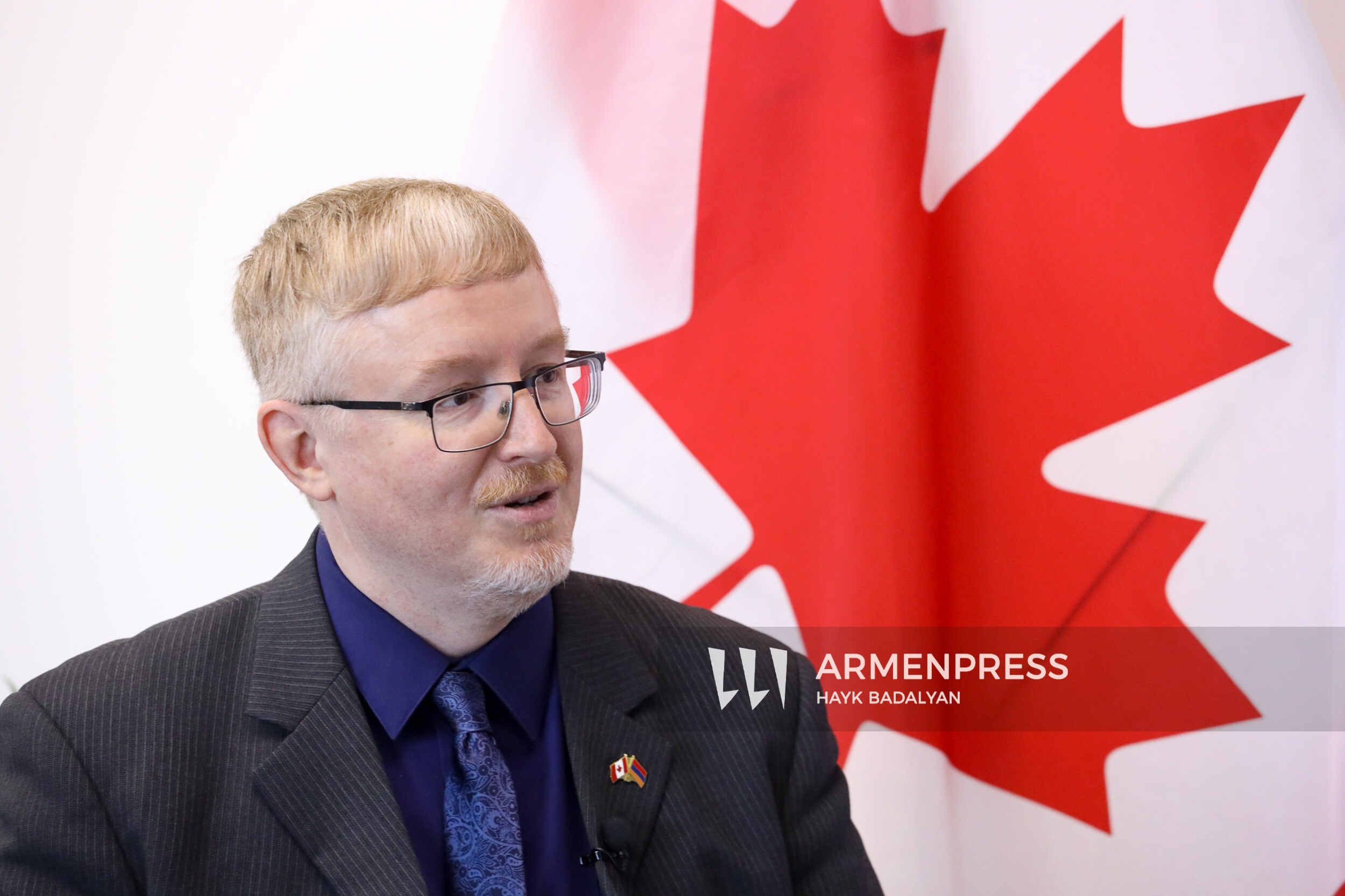
- As we know, Canada has joined the EU mission in Armenia. How would you assess the mission's work and its activities? In your opinion, what is the role of the mission in maintaining security at the Armenian-Azerbaijani border and in normalizing relations between the two countries?
- I think the work that has been done by the EU mission has been remarkable. I think it is a very visible, tangible demonstration of the international community's commitment to trying to promote peace between Armenia and Azerbaijan. And I had the chance just last week, in fact, again with another visiting official from Canada, to meet with the EU Observer Mission leadership, to meet with the Canadian observer that we have deployed, and to actually join in on one of their patrols. So we were able to see firsthand how people in the border regions are so pleased that the patrols are taking place, because they see that we are engaged. And in terms of the work that has been done, statistically it is very clear that the number of incidents in the border areas where the EUMA patrols are taking place has decreased significantly. We are working as well through the Canadian participation to help try and develop further confidence building measures. So I think the results speak for themselves, and the response that I get from everyone everywhere I go, be it from the government or simply Armenians in general, I think outside of opening the embassy itself, the contribution to the EUMA mission is probably what Canada is most visible for. And this, of course, is an excellent example of Canada-EU cooperation, and how the international community is working together to advance the peace process.
- Mr. Ambassador, since 2020, Azerbaijan has continued to take destabilizing steps in the South Caucasus. Over 100,000 ethnic Armenians from Nagorno-Karabakh were forcibly displaced from their historical homeland due to ethnic cleansing by Azerbaijan in September. Additionally, Azerbaijan refuses to withdraw its troops from the sovereign territory of Armenia. How do you think these actions affect the peace agenda in the South Caucasus region?
- Well, first, let me say, it has been absolutely heartbreaking to meet with, and hear from the refugees, of the stories of everything they have had to go through. And this was also something that Minister Joly herself made a priority in her visit, to hear firsthand. And so we very much understand what a difficult situation it is and the suffering they have faced. And I think it is remarkable and speaks very highly of the Armenian people, how quickly they have moved to welcome and help people adapt here in Armenia.
The goal from Canada is very much to do everything we can to support the peace process. It is in the best interests of all of the countries in the region to resolve this longstanding conflict. The only country that has benefited from the instability has been Russia, in terms of manipulating the countries and allowing it to maintain its influence. So a peace agreement that would allow for the resolution of all of these issues is absolutely in everyone's interest, is absolutely in Azerbaijan's interest. And the hope is that they can recognize that there is now an opportunity to resolve this to everyone's benefit. And so we continue to do everything we can to encourage that with our support for Armenia, through humanitarian assistance for the refugees, our role in the EUMA mission to assure monitoring of the border, and with our diplomatic advocacy, both in support of Armenia but also our advocacy with Baku and with Ankara to encourage them on the peace process. And all of this, of course, starting as well from the bedline principles that the rights of the refugees to return, the rights to preserve cultural heritage, all of these need absolutely to be respected as part of that process.
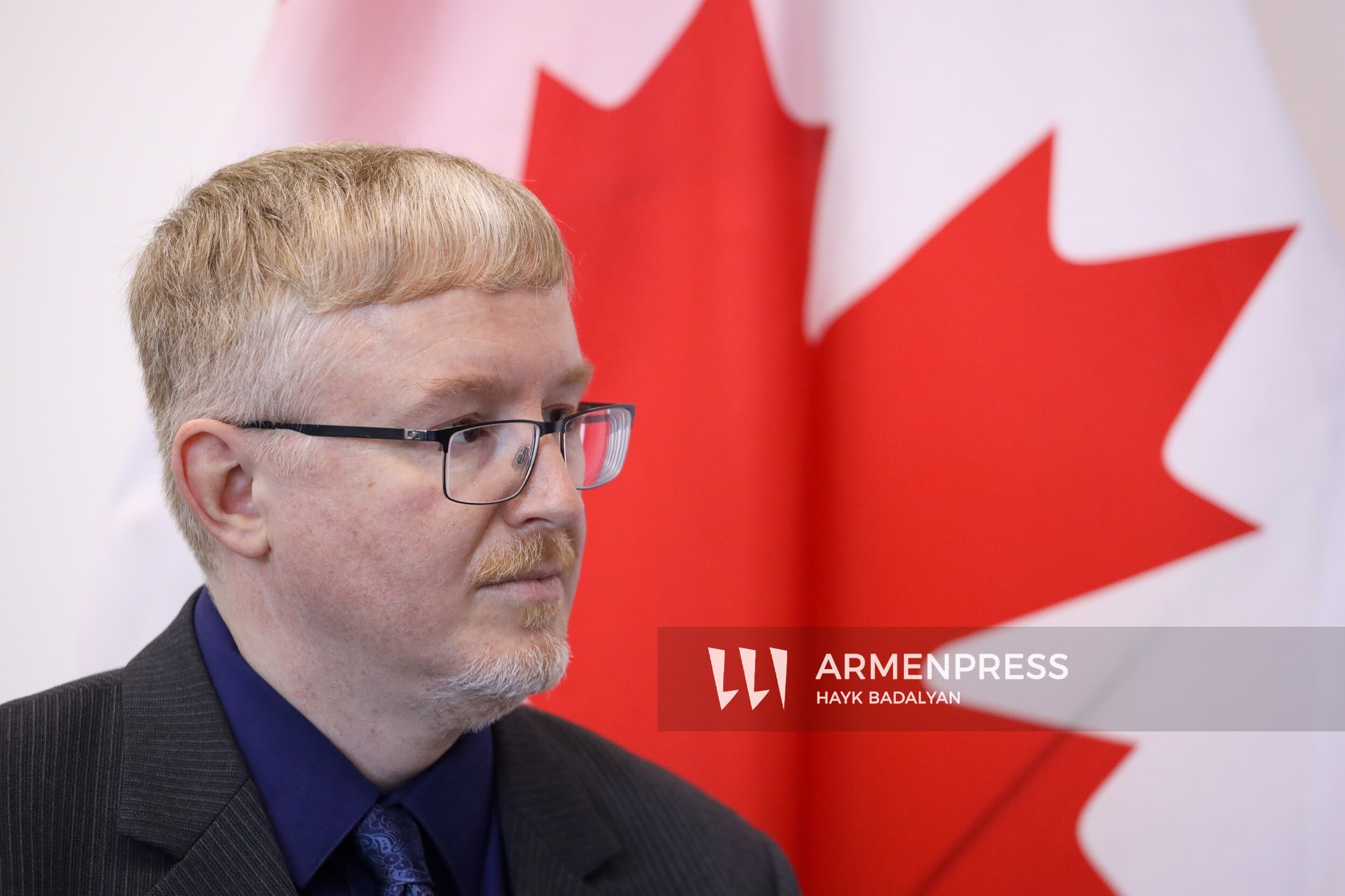
- In recent years, there has been much discussion about the need to unblock regional communications in the South Caucasus. Azerbaijan demands the so-called "Zangezur corridor" from Armenia, threatening to obtain it by force. How would you assess this aggressive and unprovoked behavior by Azerbaijan?
- From Canada's experience, we see very much the benefit of regional economic cooperation and integration. We have the tremendous benefits of the North American Free Trade Agreement with the U.S. and with Mexico, and this has made us all much more prosperous, as well as strengthened our partnership by increasing those economic ties. So the logic of having trade links throughout the South Caucasus is absolutely clear and would benefit all of the participants. That has to take place, though, on the basis of reciprocity and respect for each other's sovereignty and territorial integrity. And there are various solutions that can be negotiated, technical measures, and we have some in Canada. The European Union has many other examples. So there are ways that can be used to make this work. But what it needs to have is a genuine commitment from all parties to make that happen. And whilst it's been encouraging at times to see some progress, the agreements on prisoner releases, or the mutual support for Azerbaijan hosting the COP meeting this year, the agreements on some of the border demarcation, this has also been coupled with, at times, more, yes, aggressive, threatening rhetoric, which does not inspire confidence. And given that there have been so many decades of conflict and that there has been the very recent violence, it's understandable that there is a lack of trust, and therefore it's incumbent on all parties, and particularly Azerbaijan right now, to do everything it can to demonstrate its commitment to peace and build that trust. And so some of these threatening statements obviously do not help advance that agenda.
- In response to these claims, the Government of the Republic of Armenia published the “Crossroads of Peace” project. What is Canada's opinion on this initiative?
- The crossroads of peace seems to be an ideal solution. It brings together all of the countries in the region. It builds those economic linkages. It really provides a win-win for everyone. And again, I see it very much as a parallel to, yes, the cooperation that the European countries have developed and expanded into the European Union, again, a parallel with the agreements in North America. So this is, I think, a very clear demonstration of Armenia's commitment to peace, looking to move forward to the future and build a regional economic integration throughout the South Caucasus, and not just the South Caucasus, but then would benefit even more broadly in terms of trade routes into Europe and Asia. So this is, I think, a very clear demonstration of Armenia's constructive and open commitment to the peace process, and one that shows that there would be a benefit for Azerbaijan to engage as well.
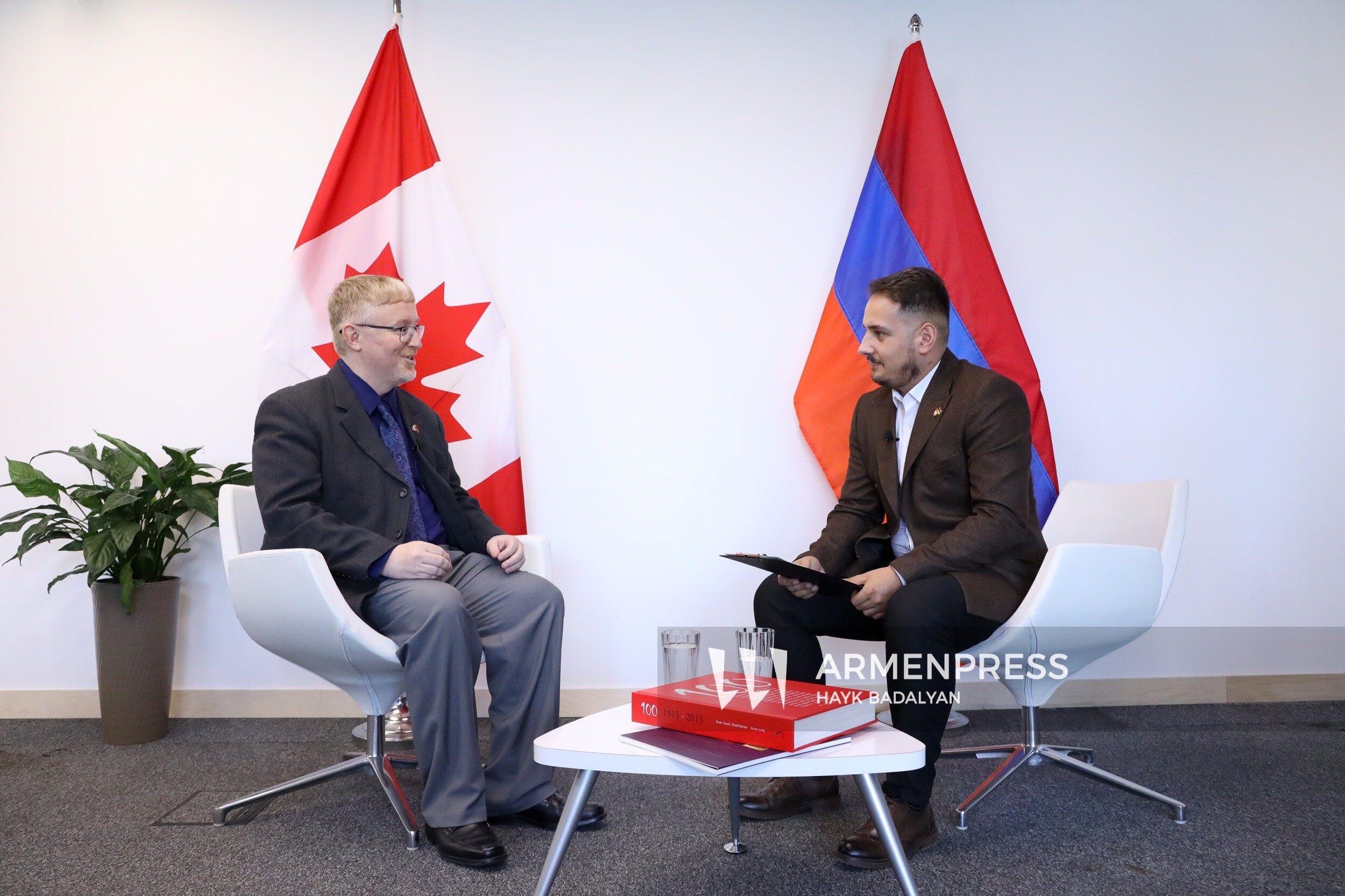
- Recently, Armenia and Azerbaijan reached an agreement on starting the border delimitation process based on the Alma-Ata Declaration. How would you evaluate this agreement and, in your opinion, can it bring peace to the two countries and the South Caucasus region?
- Given that there has been such a long history of conflict and mistrust, it is obviously very important to take steps towards peace that can help build confidence. This is not something for Canada to tell Armenia and Azerbaijan, but we certainly support anything that is going to advance the peace process. And the fact that this was the first time that there was an agreement put forward in terms of the border demarcation, hopefully provides a model that can be used to expand. So, we, as I say, from Canada, we are an outsider, we are not here to tell countries what they should be negotiating on, but we are here to support whatever steps will help advance the peace process.
- Mr. Turner, which economic areas are of greatest interest in the relations between Armenia and Canada, and what should the two countries do to develop their economic ties?
- Well, we certainly really want to make this a priority. There is significant growth in our trade relationship, but there is a lot of potential to develop it further. And again, I think this is one of the reasons why we are so pleased that the Embassy has opened, because it does help to facilitate, we can provide more information, we can identify opportunities. And already in the first few months of this year, we have seen compared to last year when the Embassy was not yet open, the volume of trade has increased by 10%, so we hope that will continue. In terms of specific areas, we certainly see a lot of potential in things like agriculture, clean tech, the ICT sector, mining, education. These are all areas where both Armenia and Canada have a lot of expertise and can cooperate. And, as I say, we had the first business delegation that came just a couple of months ago and very much focused on these areas. And we are already seeing positive results for further cooperation, contracts that are being signed. And so I am very optimistic that we will expand our economic partnership even further.
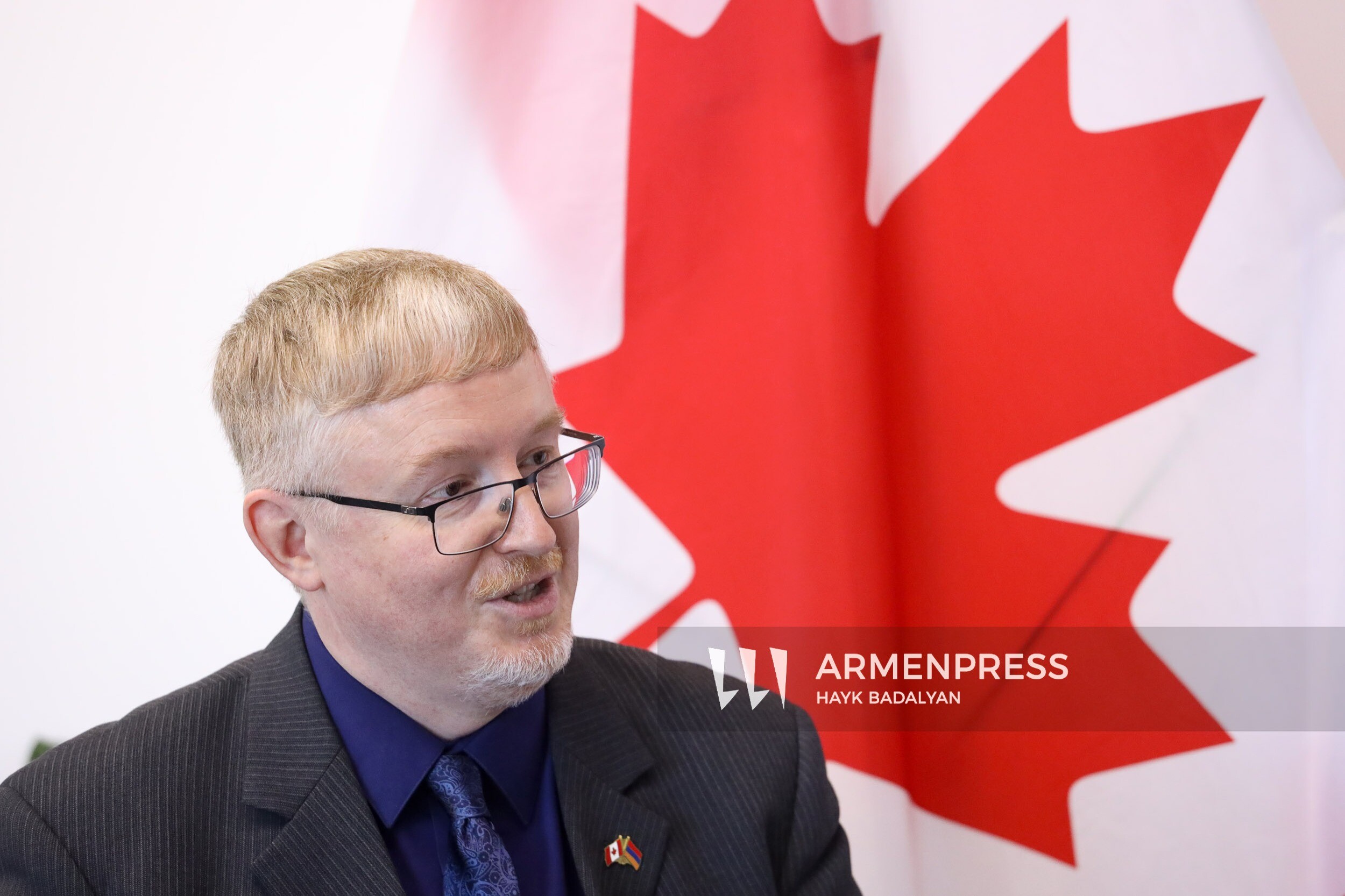
- Mr. Ambassador, are there any planned high-level visits from Canada to Armenia in the near future?
- We hope so, yes. We have been discussing further exchanges, both at the officials level and at the political level.We had established a series of annual consultations, and so we are working on scheduling the next series of that. This year it will be hosted in Yerevan, so we are hoping to organize that in the fall. And there are also some discussions about further visits from parliamentary delegations from Armenia that would go to Canada in September or October. So again, we are still finalizing the details, but it is looking very positive. And I think this is again just a demonstration of the increased interest in engagement from both sides. The number of visits has been much more in the last few months than it was in the last few years. And I think this is just a reflection of the fact that with the Embassy here and we have that base of support on the ground, it makes it a lot easier to coordinate and organize these types of exchanges. So I think we have several ones that are not quite finalized yet, but they are looking very positive for the fall. And again, this I think will just be another step and there will be even more to come going forward.
- Thank you for the interview opportunity. Is there anything else you would like to share or add?
- I think the one thing that I would really like to add is to just highlight how much I have enjoyed my time here so far. It has been quite remarkable to see how warmly the Armenian people have welcomed me and the entire Embassy. It has been very, very rewarding to see how much people appreciate Canada. I think that reflects well on the strong ties between our countries. Obviously, we have the strong links between the Armenian and Canadian community in particular. And so that has made it a remarkably positive experience for me to meet so many people, to visit so many different parts of the country. I still have many more places to go and see, but the experience of the first several months here has been absolutely remarkable for me. And it is one of the reasons now as we are getting ready to celebrate the first Canada Day that the Embassy will be organizing, that this will be a great chance to celebrate both everything that we have accomplished in the last few months and that long-standing tie between Canada and Armenia that is only going to get stronger.
Interview by Davit Mamyan
Photo: Hayk Badalyan
Cameraman: Hayk Barseghyan